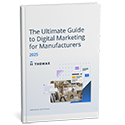Top 4 U.S. Manufacturing Challenges And How To Overcome Them
Team Thomas May 5, 2020
American manufacturing stands at a critical point in its long history — and how industry leaders view and react to the changing landscape will influence its future. As technology, demographics, and economic climate shift, manufacturers must innovate in order to stay competitive. Manufacturing in particular is positioned for domestic growth and, more than ever, industry leaders must guide their organizations strategically. Let’s take a look at some of the issues facing the industry through the lens of both challenges and opportunities.

Editor's Note: If you're sourcing suppliers for COVID-19 items, click here for those manufacturers and distributors. If your industrial business can support the production of essential supplies to combat the COVID-19 outbreak, please complete this form to notify us of your availability and willingness to dedicate resources. Thomas is working with State and Federal Government offices to help mobilize manufacturers to deliver supplies and services.
1. Multi-Generational Workforce And The Growing Manufacturing Skills Gap
During the past several years, the skills gap has been top of mind for U.S. manufacturers. In 2014, it was reported that more than 75 percent of manufacturing respondents had a shortage of skilled workers, particularly in positions requiring more than a high school diploma, but less than a four-year college degree. Research from the Manufacturing Institute and Deloitte predicts there could be as many as 2 million unfilled manufacturing jobs by 2025, up from initial estimates of 600,000. But Baby Boomers are aging and retiring and there are simply not enough skilled workers to fill the positions they’re leaving.
Although the manufacturing industry has seen incredible net growth over the past couple of decades, manufacturers are challenged to find a solution to keep up with demand.
Help Build A Workforce-Ready Talent Pipeline
While every manufacturing company has different needs, there's a general recommended plan for developing industry talent:
- Identify your talent gaps and long-term hiring needs
- Develop relationships with other manufacturers to see what initiatives are already being used
- Create a talent development system (i.e. in-house training, internships, and apprenticeships)
The millennial generation is more than 77 million strong. With proper training programs and recruitment efforts in place, this generation can help usher in a new era in the manufacturing industry. Manufacturing careers offer good salaries and opportunities to be on the cutting edge of new technologies. But they are often misunderstood in the eyes of young people and those who influence them. In 2014, seven out of ten parents wanted manufacturing in their community — but only three out of ten encouraged their children to pursue manufacturing careers. For manufacturers, this presents an opportunity for you to increase your brand strategy and share your company story. Share career opportunities with students of all ages, parents, teachers, counselors, and the community.
More manufacturers are developing partnerships with local trade schools and colleges, and implementing in-house mentoring, apprenticeship and internship programs. These partnerships are not only helpful for teens and young adults entering the industry, but for seasoned employees looking to advance their skill set.
Education within your existing workforce is also crucial for innovation. In order to successfully meet market demands, you and your workforce must understand existing technologies. Don't let your employees resist new technology out of fear or inadequate technical knowledge. Support a continuous learning culture and implement learning opportunities in your workforce as technologies and business practices quickly evolve.
It's also important to note that we now work in a modern workforce. Manufacturers are now encouraging potential retirees to stay on by offering flexible schedules and work-from-home opportunities. Due to the effects of the COVID-19 pandemic, it's now more important than ever to meet the demands of the growing manufacturing sector and create a cultural workforce that extends beyond the shop walls.
Advocate for education and training policies that strengthen the U.S. manufacturing workforce. Look at creative and innovative policies that states have enacted to encourage individuals to pursue technical education. Integrate certifications with the HR screening process for hiring and promoting workers. Highlight the return on value of internal HR policies that promote certifications. Provide work-based learning, co-op, internships and apprenticeship opportunities to give students real-world experience.
Here are some help resources to help you build a strong multi-generational manufacturing workforce:
- 6 Tips For Manufacturers: How To Keep Up With Technology Trends
- Real World Advice: How Can We Recruit The Next Generation To Fill New-Collar Jobs In Manufacturing?
- Words From A Millennial: What It's Really Like Working In Manufacturing
- Another Angle: Why Age Can Be A Major Asset In The Workplace

2. The Digital Transformation Of Industrial Sales And Marketing
As many manufacturers have already noticed, the customer buying journey is not the same as it was a few years ago — and it's still evolving. Manufacturers need to be more customer-adaptive, which means innovation and business agility are key. But many U.S. manufacturing plants are more than 20 years old and are still operating with the same business processes while competitors take advantage of the digital momentum throughout their entire company. The reality is that embracing digital best practices is the current and future state of industrial sales and marketing — and it's a challenging one.
“While many U.S. manufacturers have adopted new technologies on their factory floors,” Thomas President and CEO Tony Uphoff noted in a manufacturing roundtable discussion at The White House, “many haven’t yet adopted the new digital technologies in their sales, marketing, and supply chain management that will allow them to remain competitive in the domestic and global marketplace.”
Hire A Marketing Agency To Help Generate High-Quality Leads
B2B buying habits will continue to shift and marketing trends will continue to evolve with them — almost daily. It's understandable to not know where to start and be reluctant in adopting new technologies, but manufacturers should not let lack of knowledge in new areas hinder their business growth.
Hire a marketing agency with industrial expertise to help — someone who has been right where you are as a small business, tackled the challenges of the modern workforce, and succeeded. A manufacturing marketing agency can help grow your business because they understand the challenges your B2B buyers face and the opportunities you can take advantage of to meet their needs. They can create digital marketing campaigns to target the exact buyers you want to do business with and create the content you need to get those leads convert to a customer. Many busy business owners are not sure what to prioritize first when it comes to digital marketing — see where your digital presence can improve with a free digital health check right here.
And use these other resources to guide your digital transformation:
- The Ultimate Framework: 2020 Guide To Marketing For Manufacturing Companies
- Proven Online Examples: 32 Industrial Lead Generation Tips, Tricks, and Ideas
- Case Study: How CGR Products Used Content Marketing To Increase Their Leads By 280%
- Start Planning: What To Expect After Hiring An Industrial Marketing Agency

3. Automation And Robotics In Manufacturing
Automation in manufacturing has been transforming factory floors for years. But properly integrated automation has the ability to advance a plant for the better — and implementing these technologies strategically is the challenge.
Similarly speaking, humans working alongside robots is not the future of the manufacturing industry, it’s the here and now. Robotics is poised to influence the industry for many years to come. According to Boston Consulting Group research, spending on robotics worldwide will quadruple from approximately $15 billion in 2010 to about $67 billion by 2025. The industrial sector will grow at the fastest rate — from $5.8 billion to $24.4 billion.
It was predicted that by this year, there will be up to 30 billion connected devices with unique IP addresses. Many of these will be industrial products, so incorporating new technology to your shop floors and manufacturing workflow will be a fundamental piece in the future of U.S. manufacturing. And good news for small and medium size shops — as robotics advances, it’s also becomes more affordable. They are a competitive advantage, simultaneously helping to battle competition from overseas and the manufacturing skills gap.
Capitalize On Data To Improve Manufacturing Processes
Robotics, conveyors, and machinery can see and think better than ever before. A truly connected production line has data points throughout the warehouse and together they create an extraordinary volume of information.
To thrive in this new data-rich era, manufacturers need to improve data mining from the plant floor. Paired with smart software systems, these new technologies are making it easier to find efficiencies, assign labor, and balance different elements of the complex systems — based on real-time information rather than assumptions or prior experience. It's an amazing time saver so you can focus on other things in your manufacturing business. Ensure you have systems need in place to harness this information, analyze it, and translate it into actionable changes.
This industrial connectivity driven by new technologies is what is referred to as "Industry 4.0" and although, 85% of businesses see the potential of Industry 4.0, only 15% have dedicated strategies in place. According to an IoT Analytics Report published earlier this year, "the bulk of manufacturers considering the use of industrial IoT are currently in assessment mode: increasing their ability to understand, monitor, and predict the processes they already have in place."
Regardless of how large or small your shop is, these technologies driving Industry 4.0 is a market opportunity for every manufacturer — check out our six steps to prepare your company for Industry 4.0.
Or see how other manufacturing industries are faring to learn how you can improve:
- Challenges And Opportunities In The Aerospace Industry
- Challenges And Opportunities In The Pharmaceutical Industry
- Challenges And Opportunities In Private Labeling
- Challenges And Opportunities In Cannabis Industry
- How To Grow Your Steel And Metals Company
- Challenges And Opportunities In The Food And Beverage Industry
- How To Grow Your Textiles Manufacturing Company
- 11 Tips For Growing Your CNC Machining Business
- How To Increase Sales For Your CNC Machine Shop
- How Can Private Label Manufacturers Increase Sales
4. Increased Global Manufacturing Competitiveness
According to trading statistics, U.S. imports from China were down 12.7 percent in the first eight months of 2019 versus the same period in 2018, while U.S. imports from Mexico were up 5.9 percent, and U.S. imports from Vietnam were up 37.4 percent. This year on Thomasnet.com, we saw the highest sourcing activity surges for North American suppliers. Shifts in sourcing and shipping logistics are constantly evolving throughout the manufacturing industry, especially as a result of the COVID-19 pandemic.
More than 60% of surveyed manufacturers this year have had their sales and marketing plans impacted by the disruption of trade shows.
Manufacturers should see this as a signal to deliver the best digital customer service experience possible and increase their efforts toward digital projects that build agility and scalability to help to manage risk in uncertain times.
More insight to keep your business ahead of competitors:
- Reshoring Is Creating Opportunities For Manufacturers
- Trade Show Are Canceled — What Should You Do Now?
- Continuing To Promote Your Business During Economic Downturn
- How To Meet The Needs Of B2B Industrial Buyers
Move Forward On All Fronts To Overcome Challenges
The U.S. manufacturing industry has a bright future ahead. But manufacturers can no longer afford to think about their systems, processes, and labor force in the same way they did years ago. It’s time to innovate and figure out new (better!) ways of getting the job done. Whether it’s optimizing the production line, improving employee satisfaction, or incorporating new technology, it’s an opportunity to build the future of not only an organization, but the industry as a whole. Through ingenuity, agility, and technology, the U.S. manufacturing industry will be able to overcome its challenges and usher in a new era for manufacturing.
Here are a few ways manufacturers can take action on right now to help overcome growth challenges:
- If your industrial business can support the production of essential supplies to combat the COVID-19 outbreak, please complete this form to notify us of your availability and willingness to dedicate resources. Thomas is working with State and Federal Government offices to help mobilize manufacturers to deliver supplies and services.
- Join other manufacturing and industrial companies who are utilizing digital advertising to grow their business with a free company profile on Thomasnet.com where more than a million buyers source North American suppliers everyday.
- Request a free Digital Health Check and receive an analysis of how your online presence compares with competitors in your industry.
- Subscribe to our email newsletter, Thomas Industry Update, to get daily news like these straight to your inbox specifically for manufacturing and industrial companies.
- Contact one our industrial marketing experts to see how you can tackle your business challenges and turn them into opportunities to grow your manufacturing business.
Did you find this useful?









